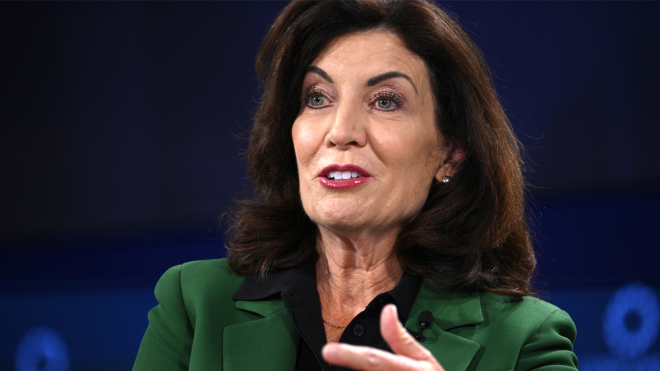This week, Senate Democrats hope to pass a significant spending measure that contains money for health care, the environment, and higher corporate taxes.
Sen. Joe Manchin of West Virginia and Senate Majority Leader Chuck Schumer of New York unexpectedly reached a compromise this week, giving Democrats hope that they will have a strong platform to run on in close seats leading up to the midterm elections this autumn.
Sen. Kyrsten Sinema, D-Ariz., a centrist who holds a swing vote in the 50-50 Senate and who Democrats view as a difficult negotiator, has been mum about whether she’ll vote for the Inflation Reduction Act of 2022, which was released on Wednesday, while Manchin appeared on five Sunday programs to defend the deal and call for its passage.
The bill’s fate could be decided by Sinema’s vote. Given the recent absenteeism of senators infected with Covid, Democrats need every member of their caucus to be present in order for it to pass the Senate and voting is not guaranteed given that they have no chance of garnering Republican support.
When asked about the bill on Sunday, a representative for Sinema said she had no comments but was “reviewing language and would need to see what comes out of the parliamentarian process,” referring to the senator who decides if legislation complies with the rigorous budget rules of the chamber.
It’s still uncertain whether Senate Democrats will be able to pass it this week without her support.
Democrats also want to approve the PACT Act, a bipartisan bill that the Senate Republicans rejected last week, to provide medical care to veterans who were exposed to toxic burn pits while serving.
Party leaders wanted to have another vote on the legislation on Monday, but it might get postponed, giving the filibuster-proof bill less time. Republicans abandoned the plan in a fit of rage over Democrats’ decision to move on with the tax and climate package, which they had assumed was doomed in light of Manchin’s earlier opposition.
Before the chamber’s August recess, according to the office of Senator Chuck Schumer, the bill will be passed. But they have left open the possibility of postponing it if necessary.
WHY HAS SINEMA NOT BEEN DECIDED?
The majority of the Democratic funding bill’s measures, which are in line with a White House framework unveiled in October 2021 and which Sinema supported, have received her support. The limiting of the carried interest tax advantage, which helps investment managers, is a significant exception.
According to numerous sources familiar with the negotiations, Sinema made it known to Democratic leaders last year that she opposes addressing what many in her party refer to as the carried interest loophole. The clause was removed from the Build Back Better Act, which was approved by the House but was stuck indefinitely in the Senate this year. However, the tax advantage was reinstated in the new law despite Manchin’s support for removing it.
Congressmen should support the plan, according to Rep. Ruben Gallego, D-Ariz., who is being urged by some Democrats to run against Sinema in 2024.
It would not be wise to block this legislation that will invest in decreasing climate change and inflation in order to preserve a tax break for the ultra-wealthy, Gallego told NBC News.
Manchin defended the measure and expressed hope that Sinema will support it on NBC News’ “Meet the Press.”
We work closely together and Kyrsten Sinemas is a friend of mine, he stated. She has made a significant contribution to this piece of legislation. And although I’d like to think she’d be in favor of it, I appreciate her decision. Based on the contents, she will come to her own conclusion.
If the package passes the Senate, House Democrats in tight races are eager to pass it.
Rep. Katie Porter of California told NBC News in an interview conducted on Saturday at Huntington Beach Pier that she expected to be extremely supportive of it. Medicare ought to be permitted to bargain for pricing. I believe that the environmental aspect of it will truly position our economy to compete with nations like China in the future.
Even Porter’s Republican opponent Scott Baugh stated that he is “interested” in the measures regarding drug price, some of which are broadly popular in surveys, and must “completely analyze” them before to taking a stance. However, he is against the rest of the measure.
In an interview at his campaign headquarters in Newport Beach, he claimed, “They’re doubling down on a disastrous policy.” “You cannot address the situation by raising taxes and spending more money.”
Sen. Pat Toomey, a fervent fiscal conservative from Pennsylvania, said on CNN’s State of the Union on Sunday that Joe Manchin “truly seems to me like he’s been taken to the cleaners.”
According to Toomey, the hike in the business tax will slow down growth and probably deepen an already existing recession.
However, Manchin seemed committed to the bill and defended the corporate minimum tax, which accounts for the majority of the new revenues, rejecting Republican criticisms of it.
You might at least assume that they are paying at least 15%. All corporations and the majority of enterprises I am aware of pay 21 percent. So, it’s not an increase in taxes. It does so by narrowing a gap “Sunday, he said. “Massive, record earnings have been made over the past two years.
“And with that stated, it has been our lowest capital investment expenditure on record. Therefore, taxes are not the cause of this.”













